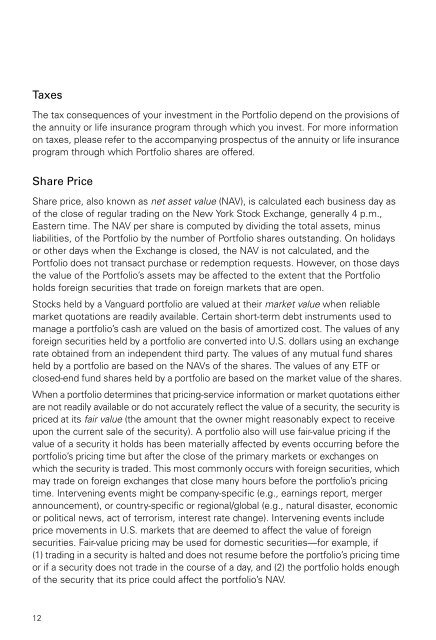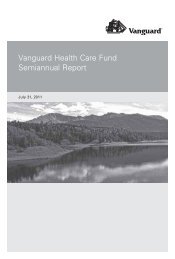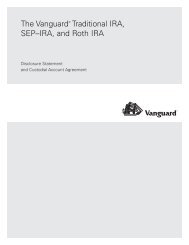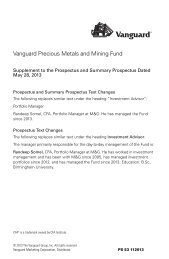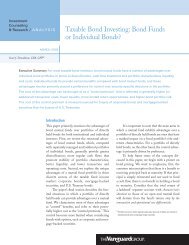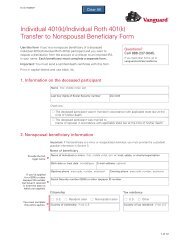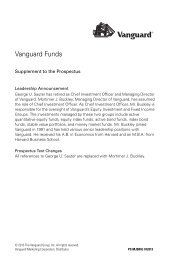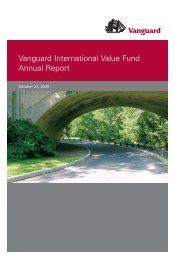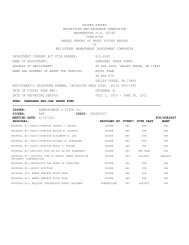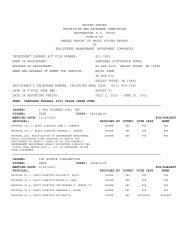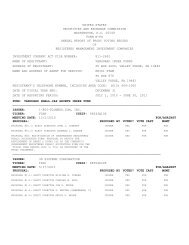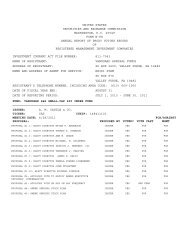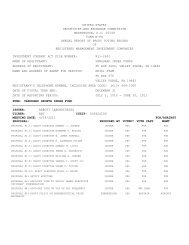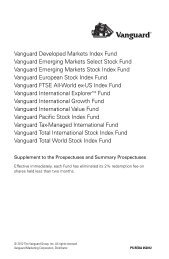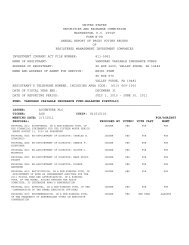Vanguard Variable Insurance Fund Diversified Value Portfolio ...
Vanguard Variable Insurance Fund Diversified Value Portfolio ...
Vanguard Variable Insurance Fund Diversified Value Portfolio ...
You also want an ePaper? Increase the reach of your titles
YUMPU automatically turns print PDFs into web optimized ePapers that Google loves.
Taxes<br />
The tax consequences of your investment in the <strong>Portfolio</strong> depend on the provisions of<br />
the annuity or life insurance program through which you invest. For more information<br />
on taxes, please refer to the accompanying prospectus of the annuity or life insurance<br />
program through which <strong>Portfolio</strong> shares are offered.<br />
Share Price<br />
Share price, also known as net asset value (NAV), is calculated each business day as<br />
of the close of regular trading on the New York Stock Exchange, generally 4 p.m.,<br />
Eastern time. The NAV per share is computed by dividing the total assets, minus<br />
liabilities, of the <strong>Portfolio</strong> by the number of <strong>Portfolio</strong> shares outstanding. On holidays<br />
or other days when the Exchange is closed, the NAV is not calculated, and the<br />
<strong>Portfolio</strong> does not transact purchase or redemption requests. However, on those days<br />
the value of the <strong>Portfolio</strong>’s assets may be affected to the extent that the <strong>Portfolio</strong><br />
holds foreign securities that trade on foreign markets that are open.<br />
Stocks held by a <strong>Vanguard</strong> portfolio are valued at their market value when reliable<br />
market quotations are readily available. Certain short-term debt instruments used to<br />
manage a portfolio’s cash are valued on the basis of amortized cost. The values of any<br />
foreign securities held by a portfolio are converted into U.S. dollars using an exchange<br />
rate obtained from an independent third party. The values of any mutual fund shares<br />
held by a portfolio are based on the NAVs of the shares. The values of any ETF or<br />
closed-end fund shares held by a portfolio are based on the market value of the shares.<br />
When a portfolio determines that pricing-service information or market quotations either<br />
are not readily available or do not accurately reflect the value of a security, the security is<br />
priced at its fair value (the amount that the owner might reasonably expect to receive<br />
upon the current sale of the security). A portfolio also will use fair-value pricing if the<br />
value of a security it holds has been materially affected by events occurring before the<br />
portfolio’s pricing time but after the close of the primary markets or exchanges on<br />
which the security is traded. This most commonly occurs with foreign securities, which<br />
may trade on foreign exchanges that close many hours before the portfolio’s pricing<br />
time. Intervening events might be company-specific (e.g., earnings report, merger<br />
announcement), or country-specific or regional/global (e.g., natural disaster, economic<br />
or political news, act of terrorism, interest rate change). Intervening events include<br />
price movements in U.S. markets that are deemed to affect the value of foreign<br />
securities. Fair-value pricing may be used for domestic securities—for example, if<br />
(1) trading in a security is halted and does not resume before the portfolio’s pricing time<br />
or if a security does not trade in the course of a day, and (2) the portfolio holds enough<br />
of the security that its price could affect the portfolio’s NAV.<br />
12


